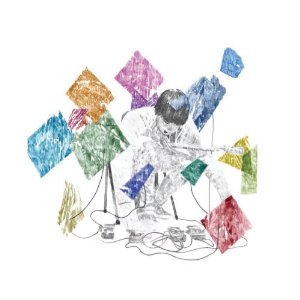John Fahey famously once said of his work: "I was playing guitar but I heard an orchestra in my head, so I was really composing for a full orchestra." If only the legendary guitarist – or the legions of others he inspired over the decades – had managed to truly realise that vision. Too often, the picking and plucking of the instrumental guitar record can be tedious in the extreme, but Dustin Wong’s Infinite Love, a double album which actually delivers on the theory, is one of the most inspiring, electrifying bundles of joy you’re likely to hear this year.
You may be familiar with Wong’s former band, Baltimore’s Ponytail, but it’s the Hawaiian-born, Japanese-raised guitarist’s lesser known earlier work with Ecstatic Sunshine that sets the template for Infinite Love. With fellow arts student Matt Papich, Wong released two albums of gently pulsing guitar duets before being joined on their third, Way, by electronics whizz Kieran Gillen, whose real-time sampling of the interlocking guitar lines added a whole new dimension to the dynamic. It’s this idea of manipulating the simple sounds that six strings can produce that informs Wong’s Thrill Jockey debut as, armed with just his guitars, an impressive array of effects pedals, and a sparingly used drum machine, he weaves together numerous strands of melody to create lush torrents of multi-coloured noise.
Infinite Love is one of those rare records that could only have been made using modern technology, but that already sounds timeless. Loosely based around the concept of twins starting and ending life as two halves of a whole, the ‘Brother’ and ‘Sister’ discs both begin with an identical repeated motif and take different journeys to the same climax. In between, layers are gradually added so that the spaces between the notes are eventually filled; once the loops are established, they are delayed and distorted to change the tones and timbres, adding body to these spider-webs of sound. Each disc is cut into fifteen bite-sized segments which flow – and occasionally crash – into each other, and although certain riffs are repeated and revisited throughout both sets, the varying tempos and textures ensure that the listener’s attention is never allowed to wander too far.
Far from being a mere compositional exercise, though, Infinite Love is a great rock (or even – depending on your sensibilities – pop) record. While it acknowledges the more accessible moments from forty years of Krautrock and minimalism (Manuel Gottsching, Terry Riley, Steve Reich), the sense of fun that always characterised Ponytail’s music outweighs the more studious aspects, and although the pace is noticeably more relaxed, Wong’s trance-inducing cyclical guitar runs even manage to recall one of his former band’s biggest influences, the mighty Boredoms, in their early Noughties psychedelic shamen phase. High praise indeed, but a fair comparison; there aren’t many bands – and even fewer solo artists – who can make music this rapturous, or use repetition to such blissfully hypnotic effect.


